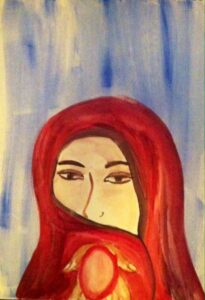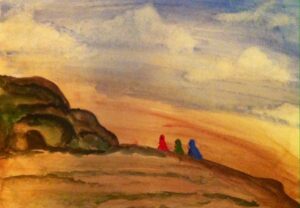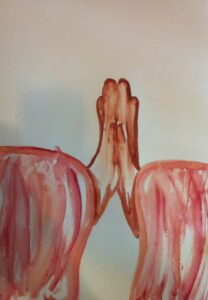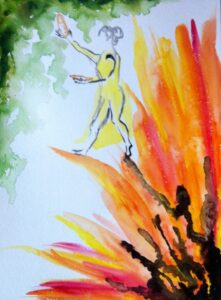Miriam
 One of the books on the shelves in my childhood bedroom that I shared with my younger sister was A Little Golden Book: Bible Stories of Boys and Girls. Here the children of the Hebrew Scriptures came alive – Rebekah at the well, Joseph and his dreams, Samuel the Lord’s child, David the shepherd, and Miriam the good sister. Each child had an encounter that, knowingly or unknowingly, brought them closer to God.
One of the books on the shelves in my childhood bedroom that I shared with my younger sister was A Little Golden Book: Bible Stories of Boys and Girls. Here the children of the Hebrew Scriptures came alive – Rebekah at the well, Joseph and his dreams, Samuel the Lord’s child, David the shepherd, and Miriam the good sister. Each child had an encounter that, knowingly or unknowingly, brought them closer to God.
The Book of Exodus begins with the bad times that had come to the children of Israel. To stop the ever-increasing number of Israelites in his land, the Egyptian Pharaoh wanted all boy babies killed. A Levite couple, Jochebed and Amram, had a son, and his mother hid him for three months. When she could not hide him any longer, she laid the baby in a covered basket of bulrushes and put the little boat among the reeds by the river bank. The baby’s big sister Miriam stood at a distance to watch over him. Pharaoh’s daughter found the baby, and saying she needed someone to care for the child, Miriam stepped forward and said, “Shall I go and get you a nurse from the Hebrew women to nurse the child for you?” not revealing that she would get her own mother, the mother of the baby. Pharaoh’s daughter said to Jochebed, “Take this child and nurse it for me and I will give you your wages.” So the happy mother had her baby back. Because his sister Miriam had watched over him, the boy grew up safe and sound at home, and when he was older, this boy Moses was educated in the Pharaoh’s palace and became the greatest leader his people knew.
Miriam’s role as big sister did not end in the simple tale of one sibling looking after another. She became a leader-prophet of the women of Israel. After crossing the Red Sea, following the great song which her brother Moses sang in honor of all Israel, Miriam organized the women in response, with “tambourines and with dancing”. “Sing to the Lord, for he has triumphed gloriously, horse and rider he has thrown into the sea.” The singing of women in ancient times gave expression to war, battle, and miracle. It is believed that the Song of Moses was actually composed by Miriam to articulate and summarize the historical experience of escaping the Pharaoh’s chariots, and also to prepare the people to cope with the forthcoming challenges. And so, Miriam was a herald; she prepared the people for what was to come following the crossing of the Red Sea. She had been the guardian of the vision; having watched over her baby brother, perhaps knowing even then that there was greatness ahead. In the wilderness she was the guardian of the vision that was to be, a new home for their people. She was, in childhood and in adulthood, the big sister who watches and worries and prepares for the future.
Miriam wasn’t a perfect big sister. Who in Hebrew Scriptures, after all, is perfect? Who of us is perfect? She and her other brother, Aaron, criticized Moses and resented his authority. “Has the Lord spoken only through Moses? Has He not spoken through us also?” The Lord called the three into a meeting, and at the end of it, Miriam only (not Aaron or Moses) was plagued with leprosy. Because of Moses’ and Aaron’s pleas, the Lord allowed her leprosy to disappear after her seven days of banishment from the camp. In a lovely touch of compassion, the people did not journey until she was brought into the camp again. She lived on, and as tradition tells, became a mother and the forebear of kings.
We Episcopal Church Women are the big sisters of the church. We are women at any age who help others find greatness and find in ourselves the greatness to lead. As some of us look to the future and to the younger women of the church accomplishing wonderful things, we can be their big sisters, watching out for them and accompanying them on their journey. We who are younger can learn from the wisdom of the women around us and know we are never alone in all the works we do. Together we are members of a women’s chorus. We give expression to the concerns of God’s people and we sing not as a call to war and battle but to peace and justice, and always to the miracles of our God. We are sisters to each other.
During the first 2 weeks of December, I will be on Pilgrimage to the Holy Land. This is my second pilgrimage, and because of Lindsay’s book, I will be looking through new eyes, through the eyes of the women who lived in the land and who spoke at the ancient sites I will see.
++++ Coming December 15th ++++
Chapter 26: Elizabeth and Mary, the mother of Jesus
Content provided by Author Lindsay Hardin Freeman
Illustration: Claire Elam









